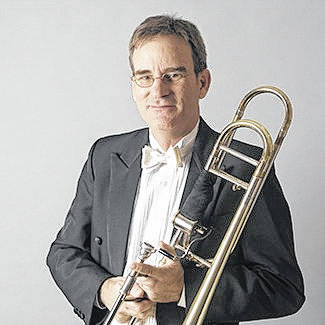Elizabethtown native Allen Barnhill, who joined the Houston Symphony orchestra in 1977 as the principal trombonist, is retiring after 44 years.
“The most satisfying moments in my musical career include any time the low brass section gets to shine,” Barnhill said in a previously published interview. “Making a beautiful sound together is what we do. We live for that. At other times, when the composer allows, we get to relax a bit and just listen to the beautiful sound of the orchestra around us.”
According to the interview, Barnhill won the Swiss Prize in the 1979 Geneva International Solo Competition, plus, he was featured in the 2008 world premiere of Cindy McTee’s Solstice for Trombone and Orchestra.
The trombonist has appeared in concert and on recordings with the Houston and San Antonio symphonies, Atlanta Symphony orchestra, Rochester Philharmonic Orchestra, Chicago’s Music of Baroque, and the Houston Symphony Chamber Players, the interview said.
“Belonging to a large musical ensemble means working intensively with my colleagues,” Barnhill said of the meaning of music. “Whether we are on stage immersed in the music of a great composer or just hang out together backstage, these are the treasured relationships.”
Barnhill is an associate professor of trombone at Rice University’s Shepherd School of Music, according to the published interview. He has also held faculty positions at the University of Texas, the University of Houston, Sam Houston State University, and the University of St. Thomas.
Barnhill graduated from the Eastman School of Music at the University of Rochester, in New York, where he studied with Donald Knaub.
In high school he played in band. the published interview said. The only chance he had to play in an orchestra was at summer music camp. It was a revelation to him. His teacher also had a Dixieland band that played in that area, and so he got to play gigs with the dance band and become a professional musician while he was still in high school.
His teacher also got him a chance to play for the Ringling Brothers Circus, which was a really demanding week of playing two circuses a day and three on Saturday.
“I was born into a family of music lovers, although none of them were professional musicians,” Barnhill said in the published interview. “My musical career has been a journey down the avenues of opportunity that were open to me by several mentor teachers. Therefore, I hope to give something back as a teacher of music performance.”
His favorites away from music are water skiing, snow skiing and golf.
Barnhill finds that he has always had a natural inclination and temperament that was suited for the trombone, according to the recent interview. He credits Ray Haney, a renowned band director in Bladen County, for identifying the talent and ability, and encouraging him from a very young age to pursue it. Barnhill said he was able to progress quickly.
“Haney put me in touch with the head of the school of music at Appalachian State, who had a doctorate in trombone from Eastman,” Barnhill said in the previous interview. “I had a couple of lessons with him, auditioned for the Eastman School of Music, and got accepted, which was still kind of a miracle to me at the time. At that time, in the early 1970s, it was the premiere trombone school in quality and tradition, so I was very lucky to get in. I graduated in May of 1977.”
Barnhill said, in the interview published a few months ago, that he had a strong desire to play in an orchestra, so getting a job in the Houston Symphony was a dream come true.
“When I started, I had a lot of idealism but not much experience, so I had a chance to develop my voice as a trombone in this distinctive-sounding orchestra,” he said in a published interview. “The orchestra, even at that time, had a rich, resonant, luxurious sound in the lower voices — low strings, low winds, low brass.
“And on top of that, there was this intense singing lyricism in the orchestra. The sound reflected the influence of our former music directors, especially Leopold Stokowski and Sir John Barbirolli. Now, we really have been able to embrace the priestly role of the trombones and tuba, the low brass. And it’s such a privilege to be involved in that. Our commodity is the sound we make, so we care deeply about it. I’m thankful for colleagues that I have.”
Brendaly Vega Davis can be reached at 910-247-9132 or bdavis@bladenjournal.com.


